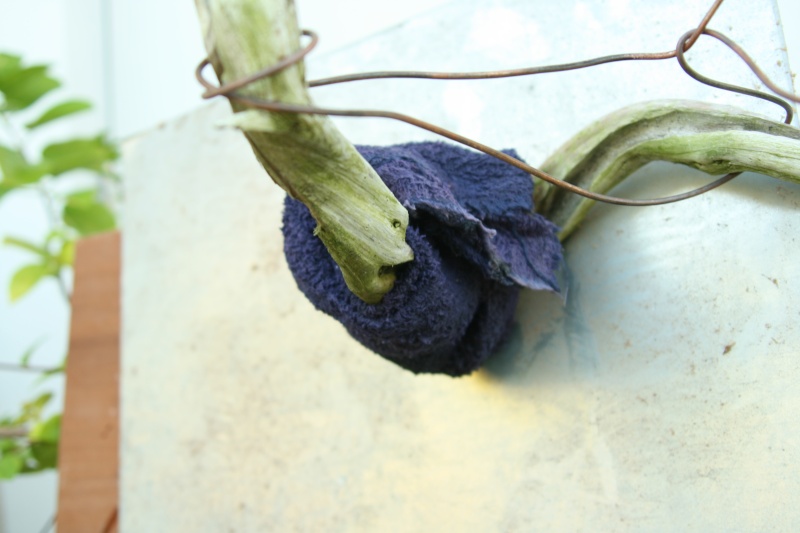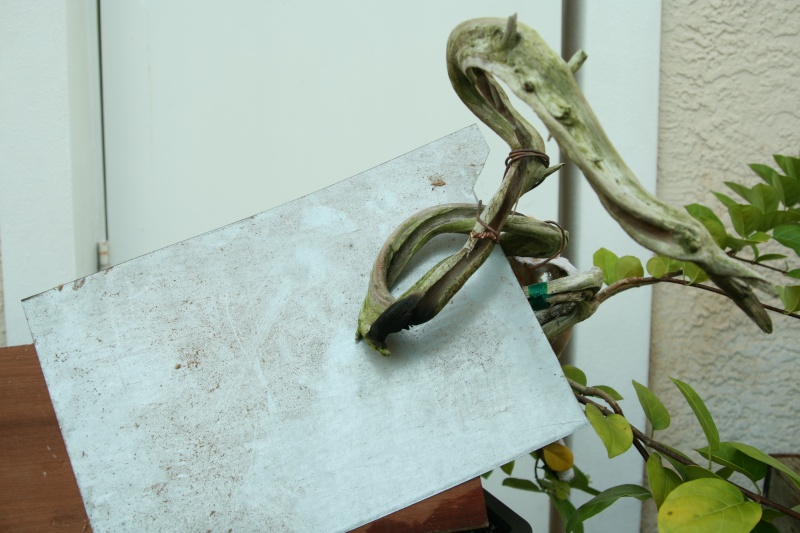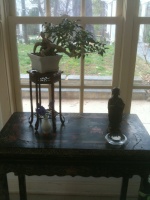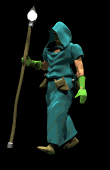Steam Bending Deadwood
3 posters
Page 1 of 1
 Steam Bending Deadwood
Steam Bending Deadwood
This photo sequence show how I used steam bending to bend a piece of old dead wood to suit a design of a tanuki.
The deadwood came from a roughly 80 year old Juniper procumbens growing next to my sister-in-laws driveway in Mississippi.
It didn't survive the collection which was real bummer as this branch was only one of the smaller ones on the tree.
About 10 years ago I tried a juniper tanuki with this branch but one of the summer hurricanes broke off the live part, so I restarted two or three years ago with a Premna cutting. I feel premna makes a better scion for a tanuki as it has a greater tendency to fill the groove in the deadwood. Note how the premna has already grown through several "loop-d-loops" of the deadwood and is near the current top of the tree. It's a nice fast growing tropical tree. The only drawback is premna is a tropical plant so it needs protection from frost.
Don't worry about the leaf size either - they reduce very quickly with a little bit of pinching. Unrestrained growth is needed to fatten the tanuki scion as fast as possible.
The deadwood has lots of twists and turns but the top did not resolve to a decent design, so I used steam bending to permanently bend the deadwood before the premna shoot got to that part of the deadwood.
As a caution, using flame and and steam can cause burns and damage to both the human operator and the live part of the tree, so if you do this take the necessary safety precautions.
The tanuki showing good growth.

.
The area to be bent

.
View prior to the bend.

.
First level of protection - a wet towel over the live material.

.
Next level of protection, a piece of old plywood to act as insulation for the heat.

.
Last level of protection is a piece of sheet metal to act a a heat sink to distribute the heat away from one single part.

.
A sopping wet rag provides the source of the moisture for the steam. The heavy copper wire will hold the wood after bending until it cools. I also used a piece of steel rebar for leverage (steel rebar not shown here)

.
I wrap the rag in aluminum foil to keep the heat a bit more distributed but you can heat the rag directly with the flame as the water will evaporate and the wet rag will not totally burn. Having said that don't take your spouse's best bath towel to do this job or you might not have a happy spouse.

After about 20 minutes or so the heat has caused steam to penetrate the wood and soften the long dry fibers The aluminum foil also has burnt away and I am using the steel rebar to bend the formerly stiff deadwood. Note where the rag unfolded I used the torch directly on the wood to further heat it up (for a very short period) but it turns out I didn't need to do that, the wood was already very flexible from the steam. I made one other bend further up without applying heat directly to the wood and it bent fine. The problem with heat direct to the wood is that it really destroys the fibers of the wood. Steam bending temporarily makes the wood flexible again without destroying them.

.
You can see the bend achieved in this view.


.
And a new planting angle. BTW, this photo is before I bent another part of the dead wood, but that photo will wait until the premna has a chance to grow a little bit more.

The deadwood came from a roughly 80 year old Juniper procumbens growing next to my sister-in-laws driveway in Mississippi.
It didn't survive the collection which was real bummer as this branch was only one of the smaller ones on the tree.
About 10 years ago I tried a juniper tanuki with this branch but one of the summer hurricanes broke off the live part, so I restarted two or three years ago with a Premna cutting. I feel premna makes a better scion for a tanuki as it has a greater tendency to fill the groove in the deadwood. Note how the premna has already grown through several "loop-d-loops" of the deadwood and is near the current top of the tree. It's a nice fast growing tropical tree. The only drawback is premna is a tropical plant so it needs protection from frost.
Don't worry about the leaf size either - they reduce very quickly with a little bit of pinching. Unrestrained growth is needed to fatten the tanuki scion as fast as possible.
The deadwood has lots of twists and turns but the top did not resolve to a decent design, so I used steam bending to permanently bend the deadwood before the premna shoot got to that part of the deadwood.
As a caution, using flame and and steam can cause burns and damage to both the human operator and the live part of the tree, so if you do this take the necessary safety precautions.
The tanuki showing good growth.

.
The area to be bent

.
View prior to the bend.

.
First level of protection - a wet towel over the live material.

.
Next level of protection, a piece of old plywood to act as insulation for the heat.

.
Last level of protection is a piece of sheet metal to act a a heat sink to distribute the heat away from one single part.

.
A sopping wet rag provides the source of the moisture for the steam. The heavy copper wire will hold the wood after bending until it cools. I also used a piece of steel rebar for leverage (steel rebar not shown here)

.
I wrap the rag in aluminum foil to keep the heat a bit more distributed but you can heat the rag directly with the flame as the water will evaporate and the wet rag will not totally burn. Having said that don't take your spouse's best bath towel to do this job or you might not have a happy spouse.

After about 20 minutes or so the heat has caused steam to penetrate the wood and soften the long dry fibers The aluminum foil also has burnt away and I am using the steel rebar to bend the formerly stiff deadwood. Note where the rag unfolded I used the torch directly on the wood to further heat it up (for a very short period) but it turns out I didn't need to do that, the wood was already very flexible from the steam. I made one other bend further up without applying heat directly to the wood and it bent fine. The problem with heat direct to the wood is that it really destroys the fibers of the wood. Steam bending temporarily makes the wood flexible again without destroying them.

.
You can see the bend achieved in this view.


.
And a new planting angle. BTW, this photo is before I bent another part of the dead wood, but that photo will wait until the premna has a chance to grow a little bit more.


Rob Kempinski- Member
 Re: Steam Bending Deadwood
Re: Steam Bending Deadwood
While the scion grows into the groove I have been thinking about possible designs for this tree.
here are two quick virtual designs.
The first one I could almost start as the scion has grown about 60% along the deadwood.

However, as a tour de force, I rather let the scion grow all along the deadwood,- that would be over 7 feet long.
Then I'd pop a canopy on top to reveal "in and out" the deadwood. Some of the sacrifice branches could be stubbed into jins to make it more believeable. Time will tell.

here are two quick virtual designs.
The first one I could almost start as the scion has grown about 60% along the deadwood.

However, as a tour de force, I rather let the scion grow all along the deadwood,- that would be over 7 feet long.
Then I'd pop a canopy on top to reveal "in and out" the deadwood. Some of the sacrifice branches could be stubbed into jins to make it more believeable. Time will tell.


Rob Kempinski- Member
 Re: Steam Bending Deadwood
Re: Steam Bending Deadwood
Rob, I learned a lot from your posting, thank you. I have a nice piece of drift wood that I don't want to wait 15 years for the juniper whips to grow into. I am trying to decide which type of material to use for it. I'm thinking of wysteria but am open to toher options (Zone 7).
Best,
Todd
Best,
Todd

Todd Ellis- Member
 Re: Steam Bending Deadwood
Re: Steam Bending Deadwood
Thanks Rob for sharing a valuable Bonsai Technique. Peter Chan on his visit to Bangalore last year had done a demo for us on the same topic. Both your future designs look very interesting. All the best on this Tanuki. Thanks again for sharing.
Ravi
Ravi

Ravi Kiran- Member
 Re: Steam Bending Deadwood
Re: Steam Bending Deadwood
Ravi Kiran wrote:Thanks Rob for sharing a valuable Bonsai Technique. Peter Chan on his visit to Bangalore last year had done a demo for us on the same topic. Both your future designs look very interesting. All the best on this Tanuki. Thanks again for sharing.
Ravi
Thanks Ravi,
I like the taller design but it will take a few mor years even with the premna's fast growth.
Do you have access to premna material? I believe Nikunj Parek's group brought some back form Taiwan several years ago during the BCI tour of Taiwan. Highly recommend it. Grows fast from cuttings too.

Rob Kempinski- Member
 Re: Steam Bending Deadwood
Re: Steam Bending Deadwood
Hey Rob,
Infact I do have a Premna in training as of now. Its a twin trunk and I got it as a sapling about a year and a half back. Still in the growth pot and I guess it'd take another 2-3 years to settle in the Father-Son style that I have planned. Haven't taken pics as it is still a good way to go... I also guess that the Parikhs could have been the source of this tree as I got the tree from our Club's Prez who in turn is a very good friend of the Parikhs.
Ravi
Infact I do have a Premna in training as of now. Its a twin trunk and I got it as a sapling about a year and a half back. Still in the growth pot and I guess it'd take another 2-3 years to settle in the Father-Son style that I have planned. Haven't taken pics as it is still a good way to go... I also guess that the Parikhs could have been the source of this tree as I got the tree from our Club's Prez who in turn is a very good friend of the Parikhs.
Ravi

Ravi Kiran- Member
 Similar topics
Similar topics» anchoring for bending
» baby bending branches
» first tree in my new collection, a small mugo
» Bending Beech Branches
» Bending Boxwood branches
» baby bending branches
» first tree in my new collection, a small mugo
» Bending Beech Branches
» Bending Boxwood branches
Page 1 of 1
Permissions in this forum:
You cannot reply to topics in this forum






